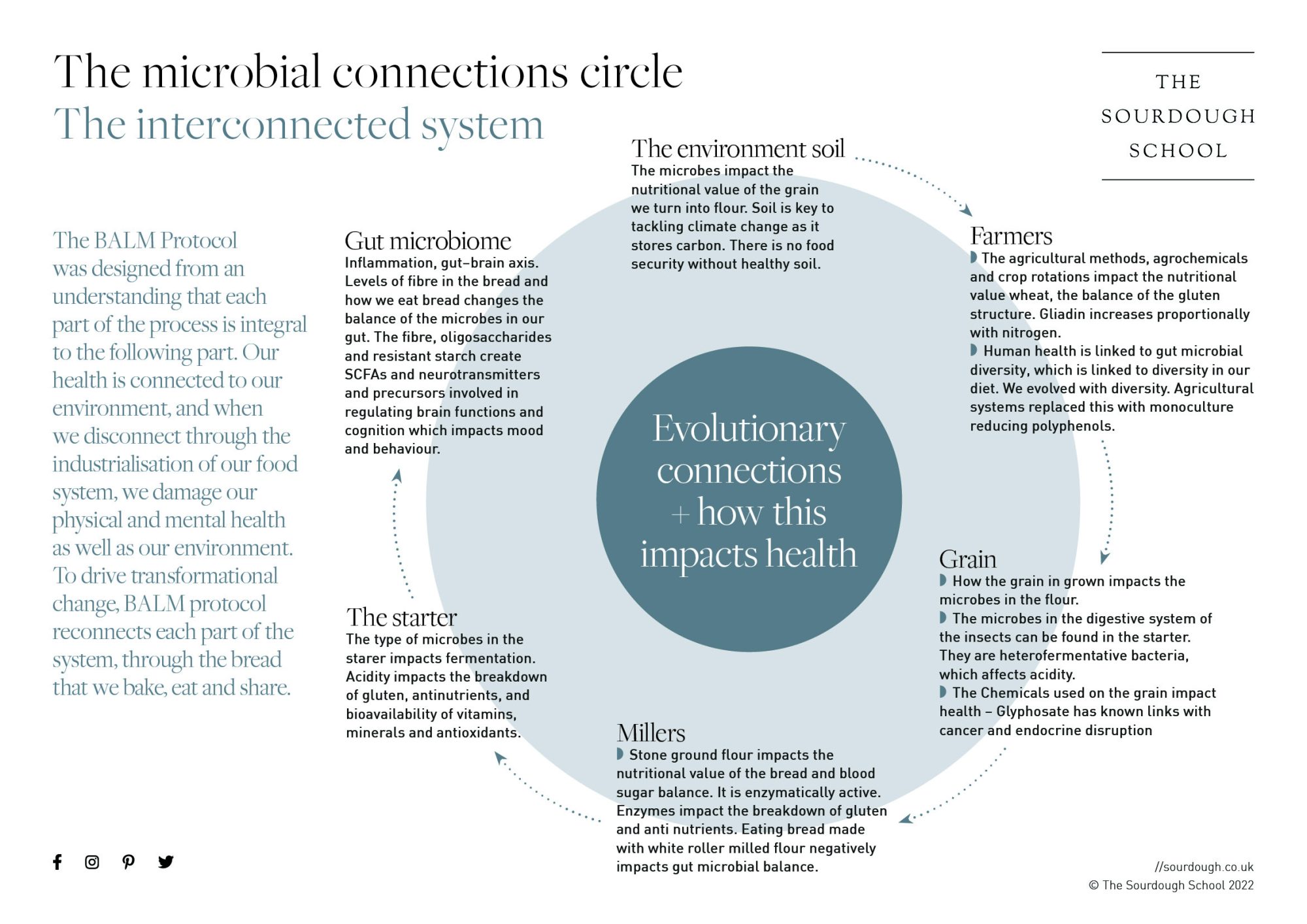Learning Objective
The theory of Microbial Equality interconnects soil health, human health, food quality, and social justice, emphasizing the necessity of nurturing our microbiomes at all levels for a healthier and more equitable world.

I’ve been teaching about my theory that I call The Theory of Microbial Equality.
Im many ways I have felt that the discconection from microbial systems and processed have been driving inequality and we need to restore and cherish this interconnectedness of our health, our food systems, and our societies.
It’s a clear and logical concept that I very much hope will guide individuals, communities, and policy-makers towards creating healthier, more equitable, and more sustainable food systems, and it is especially relevant for bread.
This theory posits that balanced and diverse microbiomes across different environments – the soil, the human gut, the mouth, and even within a sourdough starter – are essential for optimal health, environmental sustainability, and social equality. It is this theory that is key to BALM Protocol, and it is critical to understand the role of microbes in relation to human rights and the democratisation of bread. Microbial Equality advocates that everyone, regardless of their socioeconomic status, should have the right to foods that support a diverse and healthy gut microbiota. By highlighting the connections between soil health, food production, and human health, it promotes more equitable food systems that consider not just the quantity of food produced but also its nutritional quality, ecological sustainability, and social equity.
This theory starts from the understanding that the health of our soil, like our bodies, is significantly influenced by its microbiota. Regenerative agriculture, which enriches soil health and biodiversity, can thus contribute to a more diverse and nutrient-rich food supply. Industrial farming practices, on the other hand, can deplete soil health and, over time, lead to less nutritious crops.
The Theory of Microbial Equality underscores that more nutritious food, in turn, supports a healthier human gut microbiome. Consuming a diverse range of nutrients fosters a diverse gut microbiome, which is known to be beneficial for health. Conversely, a less diverse gut microbiome is linked to various health conditions.
Sourdough bread, prepared using traditional methods and using Botanical Blend Flour provides high-quality ingredients, provides an accessible and affordable means of improving dietary diversity. The fermentation process also enhances the nutritional value of bread and helps to balance our gut microbiome, further contributing to health equality.
The mouth microbiome, similarly, is implicated in overall health, with imbalances potentially linked to conditions like cardiovascular disease. The act of eating diverse and nutritious sourdough bread could influence the oral microbiome’s diversity and ,thus overall health.
Finally, the Theory of Microbial Equality acknowledges the influence of the Social Determinants of Health on our microbiomes. Socioeconomic factors can impact our diet and lifestyle, which in turn affect our gut microbiome. By advocating for equitable access to nutritious food like sourdough bread, and knowledge about its benefits, this theory calls for the removal of systemic barriers to a healthier microbiome a healthier society.
A Working Theory
Importantly, this theory doesn’t just describe a problem – it provides a pathway to a solution. It calls for action on multiple fronts, and underpins BALM and the systems change programme, embracing regenerative farming practices that nurture soil health and biodiversity, educating communities about the importance of gut health and nutrition, advocating for policies that make healthy, diverse, and sustainably-produced foods accessible and affordable, and fostering a sense of responsibility for our food systems within individuals and communities.
Learning Outcome
My theory, when used, is a powerful tool to explain and promote practices that support microbial health and recognize the interconnectedness of our health with that of our planet. It argues for policies and initiatives prioritising regenerative agriculture, traditional food preparation methods, and equitable access to these resources.

